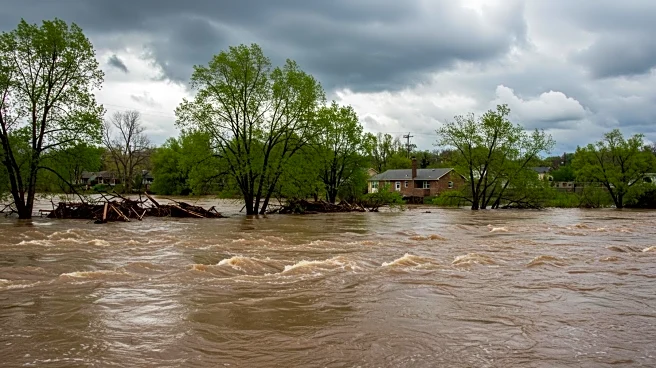What's Happening?
Pakistan is experiencing severe flash floods that have resulted in significant destruction across the country, particularly in the Khyber Pakhtunkhwa (KP) province. According to reports, at least 340 people have died, and hundreds are missing due to the floods. The National Disaster Management Authority (NDMA) has reported that since June 26, torrential monsoon rains, flash floods, and landslides have killed at least 657 people, including 171 children and 94 women, and injured 929. The KP province alone has reported 390 deaths. Rescue operations are ongoing, but officials have expressed concerns that the chances of finding survivors are diminishing. Entire villages have been wiped out, and mass burials are taking place as the country grapples with the aftermath of this natural disaster.
Why It's Important?
The floods in Pakistan highlight the severe impact of climate-related disasters on vulnerable regions. The destruction of homes, infrastructure, and loss of life underscores the urgent need for effective disaster management and climate adaptation strategies. The situation poses significant challenges for the Pakistani government, which must coordinate rescue efforts and provide relief to affected communities. The floods also raise concerns about the long-term economic and social impacts, as displaced populations may face difficulties in rebuilding their lives. International aid and support may be crucial in addressing the immediate needs and facilitating recovery efforts.
What's Next?
The Pakistani government has declared several mountainous districts as disaster-hit areas and is bracing for more torrential rains in the coming days, which could exacerbate the situation. Rescue workers continue to search for survivors, but the focus may shift towards providing relief and support to those affected. The government may seek international assistance to bolster its response efforts and address the humanitarian crisis. Additionally, there may be discussions on improving infrastructure and implementing measures to mitigate the impact of future climate-related disasters.
Beyond the Headlines
The floods in Pakistan may prompt a reevaluation of climate policies and disaster preparedness strategies in the region. The event highlights the need for global cooperation in addressing climate change and its effects, particularly in vulnerable countries. There may be increased advocacy for sustainable development practices and investment in resilient infrastructure to better withstand such disasters. The situation also raises ethical considerations regarding the prioritization of aid and resources for affected populations.








